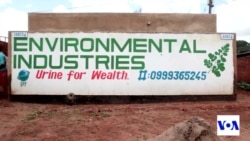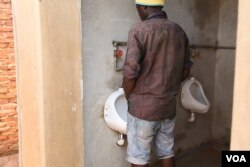In Malawi, farmers around the capital are using human urine on their crops instead of costly imported chemical fertilizers. It's the result of an innovative local initiative that is transforming the lives of both the farmers and city residents.
There is a new business in the Area 25A neighborhood these days: selling human urine for use as crop fertilizer.
Everyday people carry buckets of the stuff to the market.
Seventy-five-year-old Modesta Kamoto said she uses the money to pay for school fees and buy food, soap and school uniforms for her ten orphaned grandchildren.
She collects the urine every morning from plastic containers her family members use as urinals and sells it to "Urine for Wealth" project.
Urine has been nature's fertilizer for millennia though that's not a well-known fact nowadays in the age of chemical fertilizers.
Malawian agriculturist Goodfellow Phiri started "Urine for Wealth" as a small family initiative nine years ago. It has grown into a thriving business. The project was one of six finalists for the HIVOS Social Innovation Award in Amsterdam in 2014.
"We buy 20 liters container at 1,000 Kwacha [$1.40] and five liters container, we buy at K300 [$.41]. When we process that into fertilizer, we sell the same to farmers. Twenty liters we sell K3,000 [$4.00] and five liters at K1,000. [$1.40]," said Phiri.
He can buy up to 200 liters per day.
Phiri ages the urine in airtight containers for seven days. The process kills germs, and the smell, and it makes the liquid rich in nitrogen. He sometimes adds lemongrass to help with odor but says no additives are actually needed.
Farmers say the fertilizer is cheaper and more environmentally friendly than chemicals.
Urine for Wealth has now erected a urine harvesting plant at the main market in Area 25A with funding from 2 environmental NGO's. People are encouraged to relieve themselves there in special urinals.
The project also has women selling composite manure they make mixing the urine with animal waste. Enelet Chadza is a widow and leads a group of 20 women.
She said her worries are gone and that she is able to feed her family with what she earns.
Despite their success, Phiri said challenges abound.
"The greatest challenge with this product, which is a bio-nitrate fertilizer, is that many people don't like it. They think it's unhygienic to apply fertilizer made from human urine," said Phiri.
Seed companies and the Ministry of Agriculture have enlisted Urine for Wealth to produce fertilizer for their demonstration fields, something Phiri hopes will win over more farmers to the idea.







